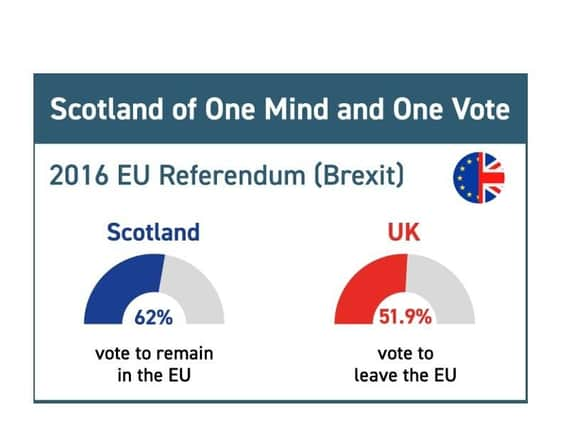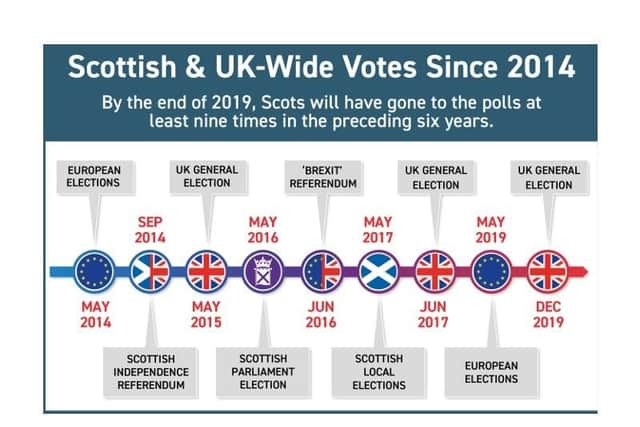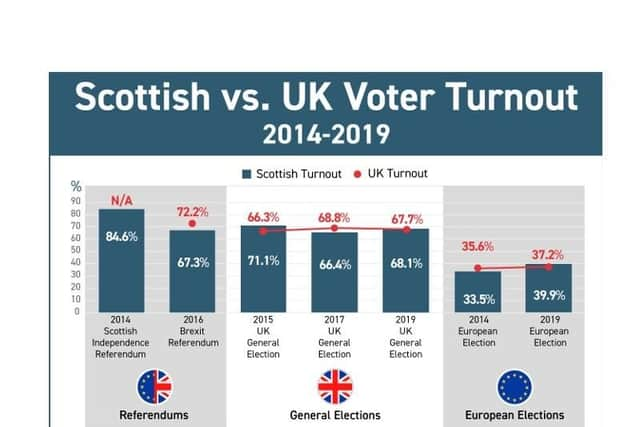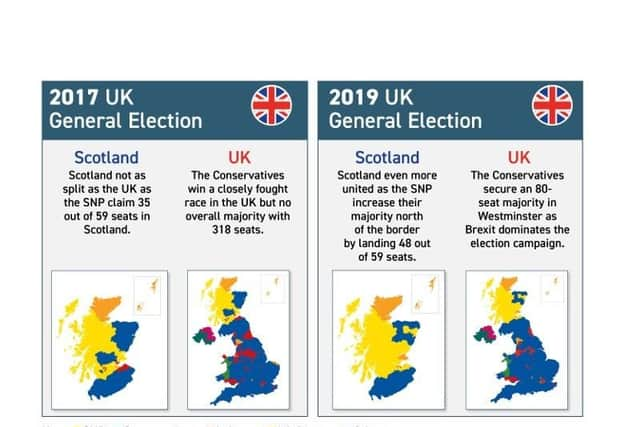Is Scotland sick of voting? We look at the evidence


Since 2014, Scotland has had no less than nine major votes. For those pushing their agendas at Holyrood, insisting that the Scottish people need to be heard has become a political cosh with which to bash opposing parties. In other words, there’s a growing a sense that voters are being shunted from polling station to polling station to help politicians score points.
Now, that’s not to say the Scottish people don’t like to vote. Indeed, over the last five years, outcomes have often been balanced on a knife-edge. The Scottish independence vote of 2014 saw an 84.6 per cent turnout rate with a 55.55 per cent to 44.5 per cent no/yes split. In 2017, while the national turnout rate for the general election was 63 per cent , Scottish voting statistics show a turnout rate of 66.4 per cent. But, while Scots have often exceeded national expectations when it comes to voting, some believe that signs of apathy are creeping in.


Scottish Turnout Rates Take a Tumble – But People Will Vote When It Matters
Although 2017’s turnout rates were up on the UK average, 66.4 per cent was down on 2015’s 71 per cent participation score. Similarly, when Scotland voted 62 per cent to 38 per cent in favour of remaining in the European Union (EU), the turnout rate was 67.2 per cent compared to 72.2 per cent for the UK as a whole. Delving deeper into the numbers, apathy rears its ugly head once again when you survey the Scottish electorate.
Between 2017 and 2018, the total number of people registered to vote fell by 0.6per cent. Yes, compared to 2011 when 3.99 million were registered to vote, 2018’s tally of 4.11 million looks strong. However, there has been a slow but noticeable decrease in electoral numbers since 2014. Part of the problem could be attributed to lower interest rates among young people - between 2017 and 2018, 5,200 fewer 16- and 17-year-olds registered to vote.
According to National Records of Scotland, 78,400 "young people" were registered to vote in local government and Scottish Parliament elections. That total represents a 6.2 per cent drop from the previous year. Could it be that young voters, moreover voters in general, are starting to grow tired of voting? Are people starting to feel like their voices aren’t actually being heard?


Despite the recent drop in interest, the 2019 General Election saw Scottish voters turn out in force. Up by 1.7 points, December’s turnout topped 68.1 per cent. That score not only shows an uptick in interest since the 2017 General Election, it surpassed the UK average (67.7 per cent). Is that a sign that voters in Scotland aren’t apathetic? Thinking scientifically, a sample size of one isn’t enough to swing the result. In other words, an upswing in 2019 doesn’t necessarily mean everyone is hot on voting.
Indeed, 68.1 per cent is still down on the 71.1 per cent turnout rate in 2015. What’s more, it’s a far cry from the 84.6 per cent turnout rate for the 2014 Scottish independence vote. So, what are we to take from this? It seems, Scottish voters want to have their say when they feel as though the question is worth asking. Although politicians would argue that all questions are worth asking, there is a sense that asking the same or similar questions more than once is a tedious practice.
The 2019 General Election was more than a vote to see which party would lead the UK. With Brexit looming and implications for Scottish independence, the question of who should lead the country carried more weight than it has in recent years. However, the General Election is greater than the sum of its parts. Even though Brexit and Scottish independence may have boosted the latest turnout rate, it’s not a guarantee that people will want to vote on them again in isolation.


Does the Brexit Question Matter?
Looking at Brexit, we know that the majority of Scottish voters did vote to remain within the EU. Are they prepared to go to the polls again to reiterate that point? The answer, in reality, is it depends. If there’s new information, they may do. Since 2016, pros and cons on both sides have become apparent. For example, leaving the EU with a deal and staying within the single market could facilitate more trade deals. On the flip side, many argue that a soft Brexit is not actually Brexit at all. Expanding the argument, leaving without a deal could open up more new trade opportunities outside of Europe. Again, however, the counter is that the UK may still have to follow EU laws and regulations in certain instances.
Put simply, we don’t know what the outcome of Brexit will be now, so how could we be expected to predict, let alone know, back in 2016?
Uncertainty Can Breed Discontent and Apathy
Something else Scottish voters may not have taken into consideration was the impact on the GB pound. For voters capable of answering the question "what is forex trading", the ties between politics and currencies are abundantly clear. When you invest in a forex pair, you’re essentially saying that the value of one will increase or decrease against the value of another. When political unrest occurs, the base currency (i.e. the one against which you judge the value of another currency) will often take a hit. As we’ve already seen, GBP has endured a rough ride over the last three years.
Looking at the GBP/USD rates pre-Brexit vote, the latter’s value has dropped. In July 2015, the exchange rate was £1/$1.44. By the end of 2016, it had fallen to £1/$1.17. For Scottish travellers planning a trip to the US, the impact of Brexit uncertainty is obvious. However, on a larger scale, these fluctuations can hurt businesses. From currency rates, you can also get into issues such as oil prices. With Scottish oil reserves a major contributor to the country’s coffers, political unrest can also be massively financially damaging to the economy.
Essentially, what’s clear here is that nothing is clear. In a sense, it may not be the case that Scottish voters are tired of going to the polls. In reality, they’re not sure what they’re going for. If people feel as though they’re answering the same question time and time again, they won’t vote. Similarly, if it’s not clear what the question is or what the facts are, they won’t vote. Put simply, uncertainty breeds discontent. Based on that, it may not be fair to say that Scottish voters are apathetic by nature.
People Want to Vote But Only When the Time is Right
Looking at the Scottish independence vote of 2014, there were inherent unknowns such as the status of the GBP in Scotland. Following the 2019 General Election, if we’re asked to vote on independence of Brexit again, do we really have all the facts needed to make an informed decision? Moreover, why are we being asked to vote? Elected MPs are given a mandate to carry out the will of the people.
According to the 2016 vote, the overall consensus was a will to leave. While few would argue it’s not a simple black and white process, there is the argument that it’s not the electorate’s problem. MPs are paid to run the country and make tough decisions; yes, these might be tougher decisions than usual, however, that’s part of an MP's job. Following that line of thought, it’s possible to argue that MPs are actually shying away from making decisive decisions, relinquishing responsibility, and passing the buck through a seemingly never-ending cycle of ballot boxes.
While there are strong arguments both for and against continued referendums, there is an overriding sense that enough is enough. Scottish citizens are facing the prospect of nine, ten or maybe even 11 major votes within the space of five years. Regardless of your political position, it’s hard to say that’s not overkill. Yes, people want to have their say; however, they only want to do so when they feel informed and empowered. If people feel as though their voices are being used to score political points rather than affect real change, voter apathy will be the result.
IG is a global online trading and investments provider. For more information visit their website